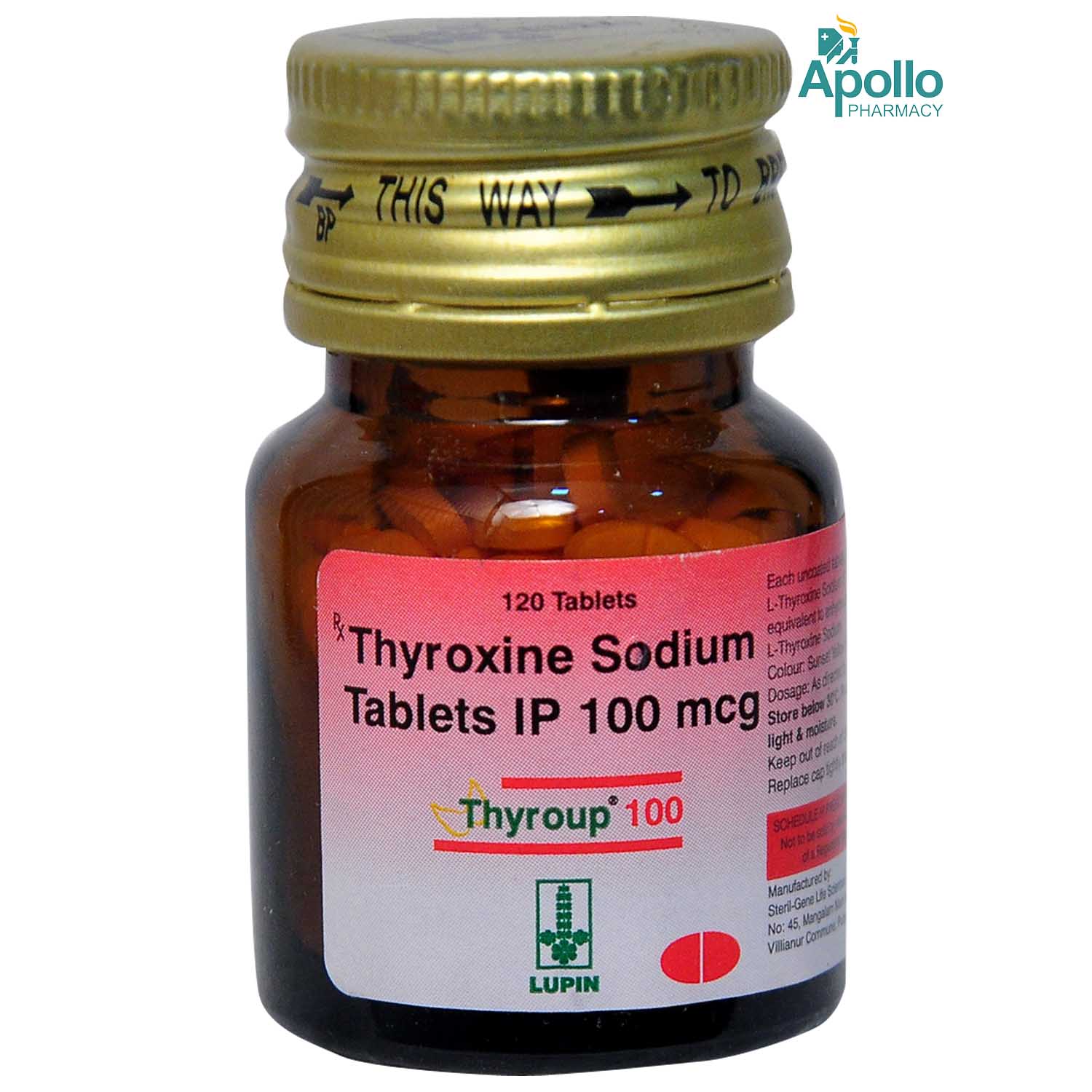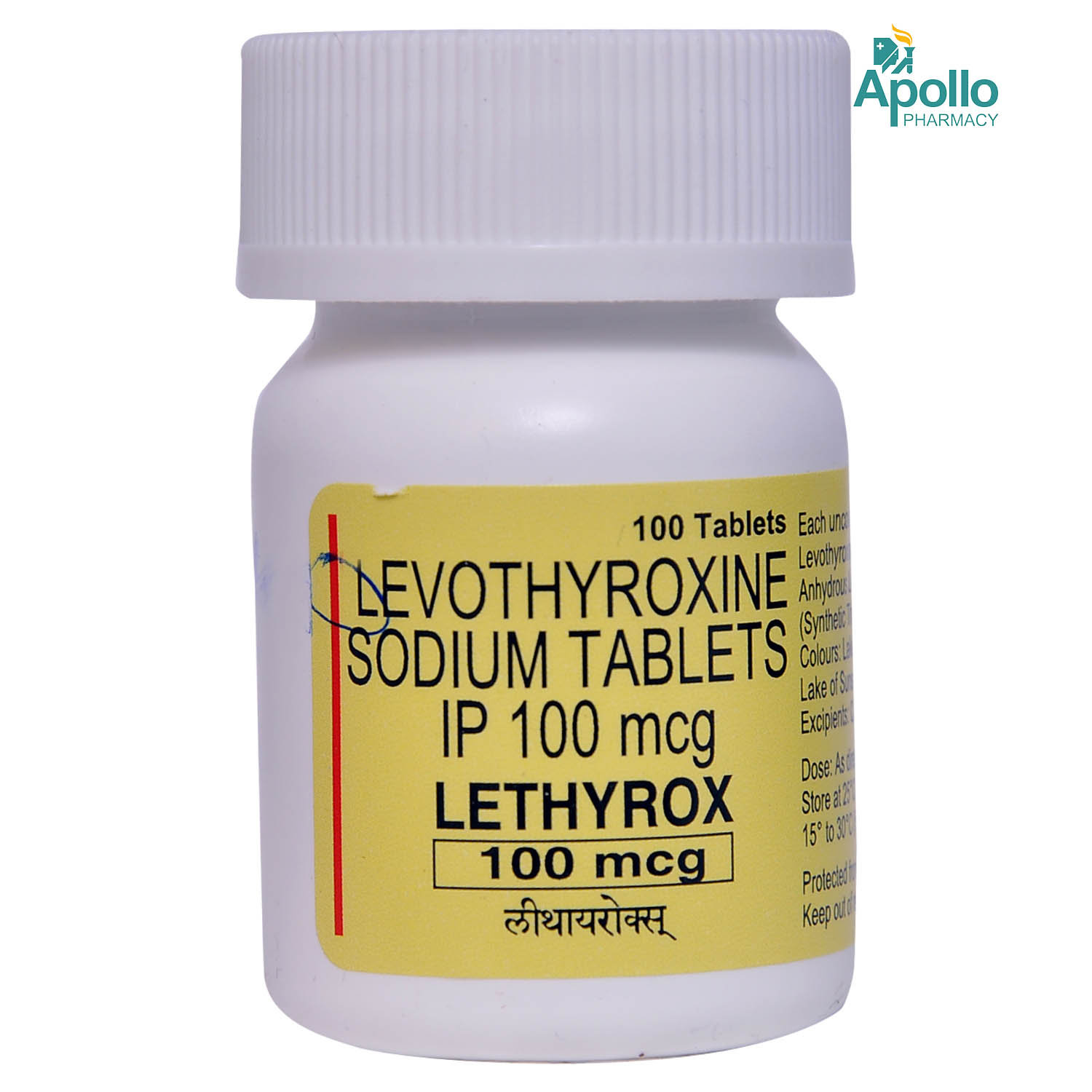THYROUP 100MCG TABLET
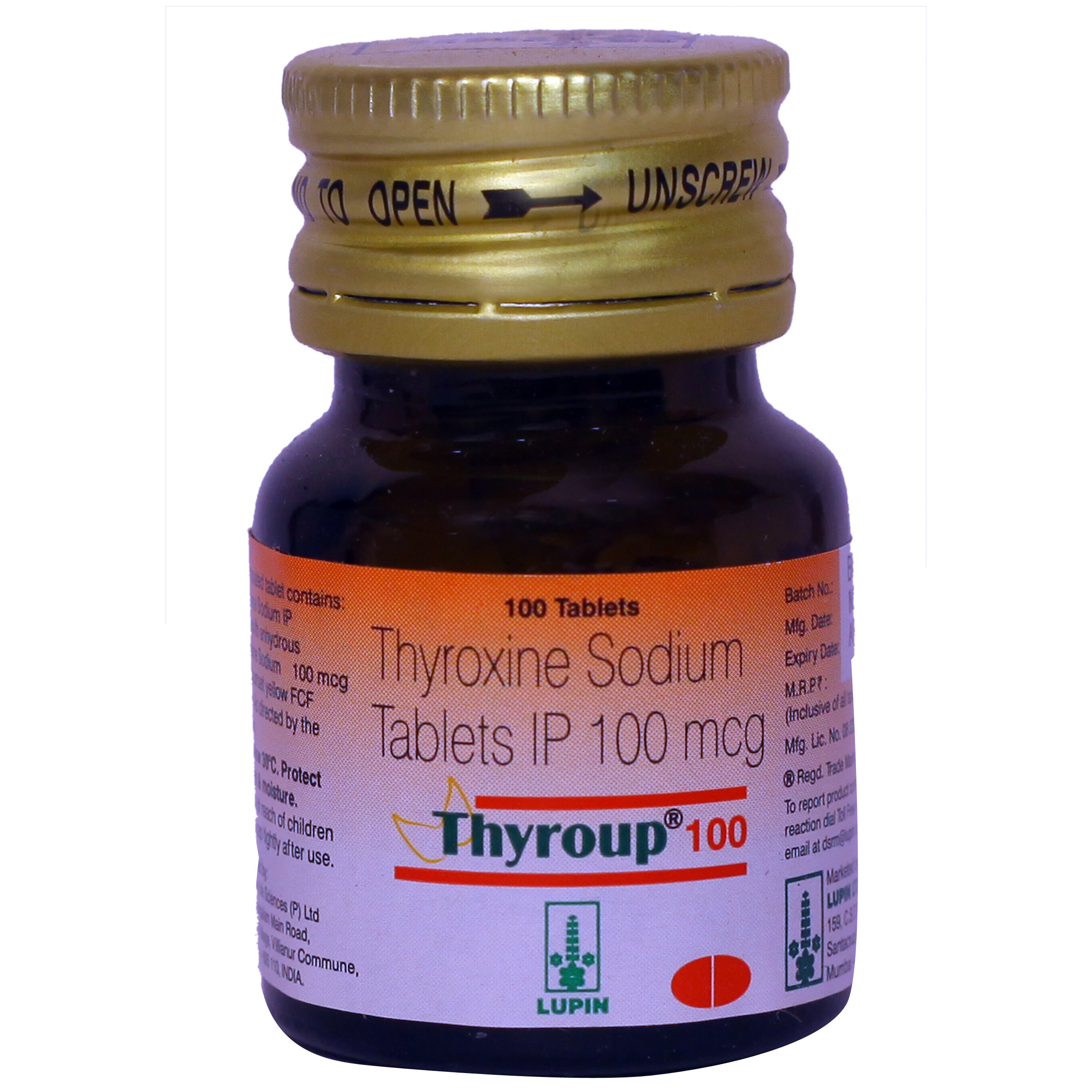
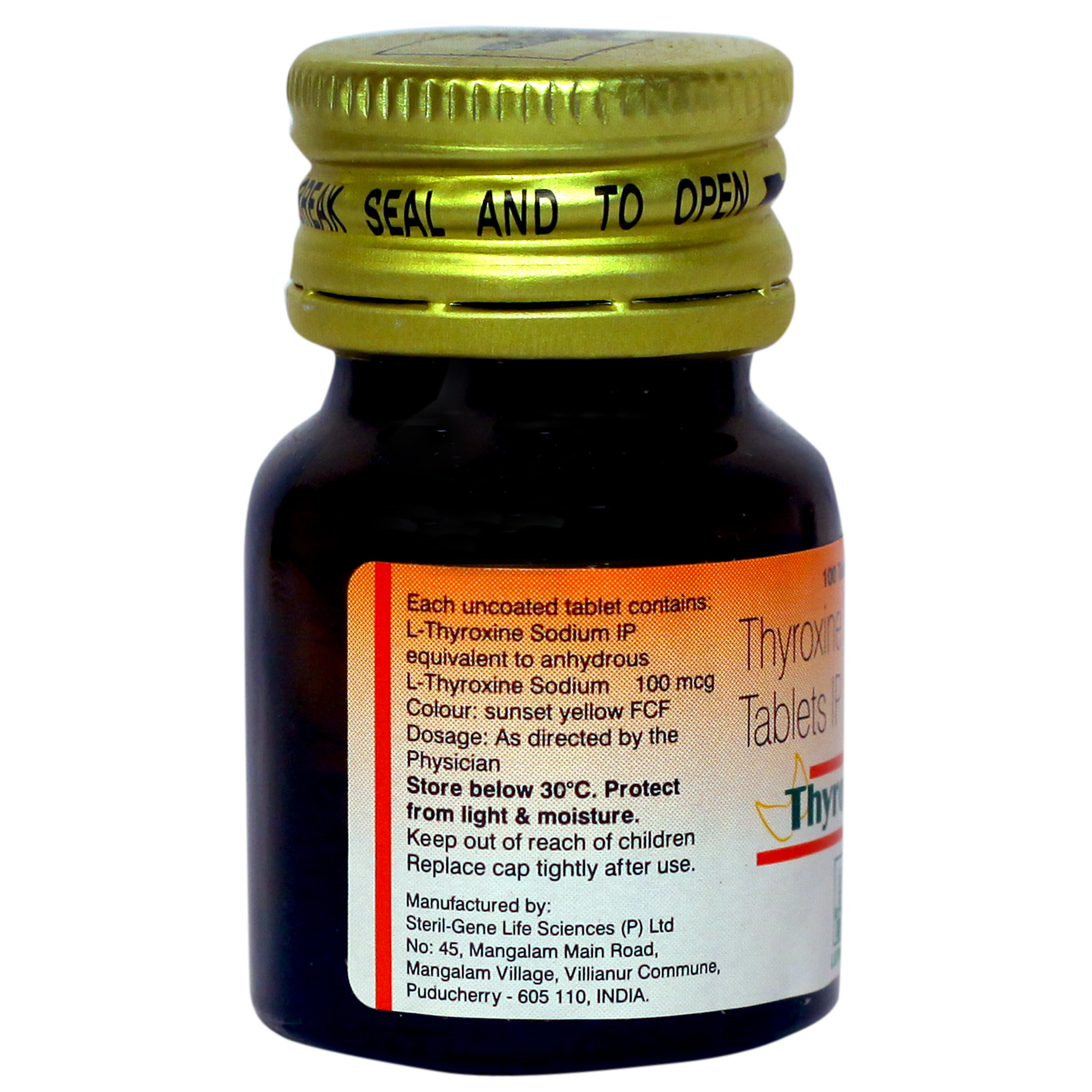

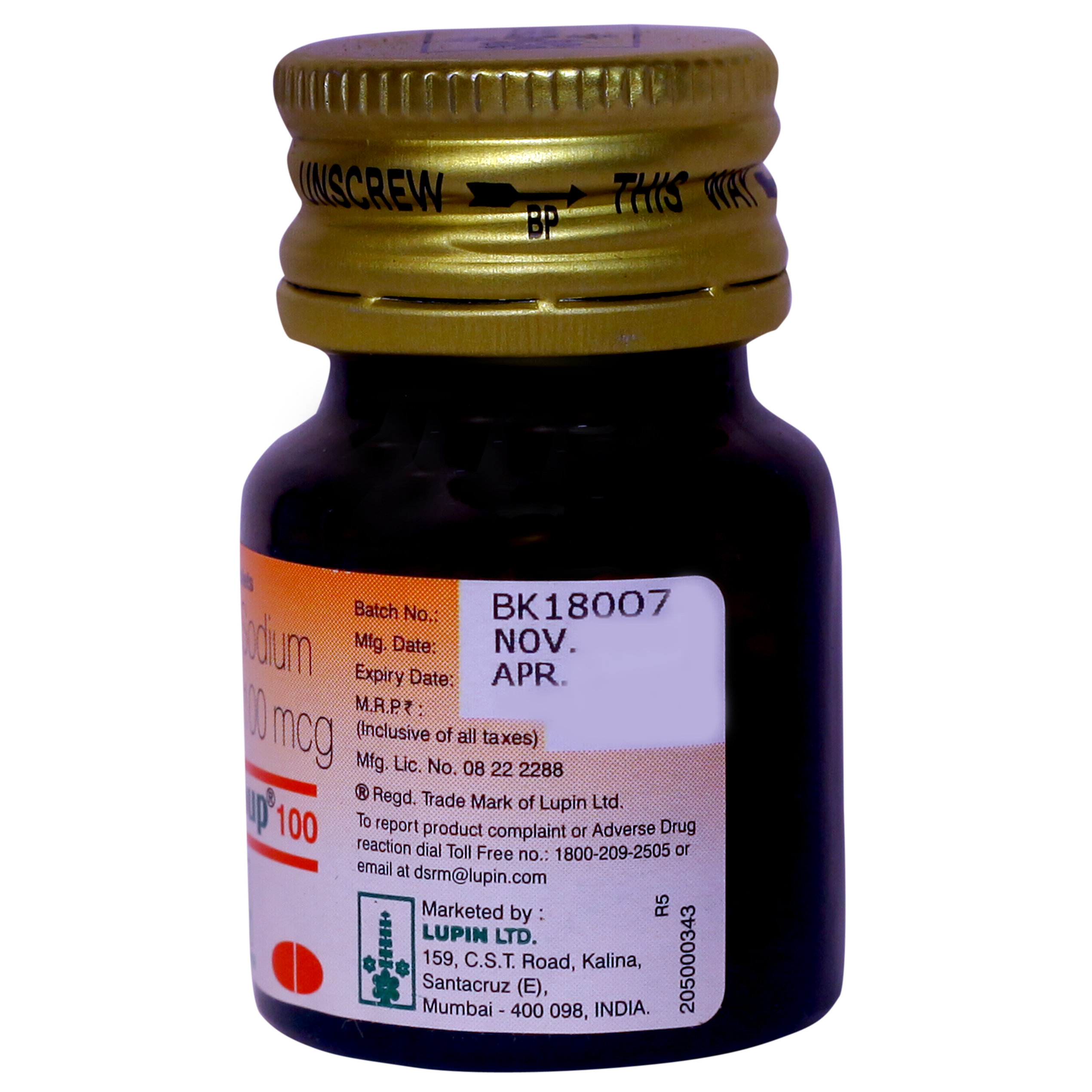
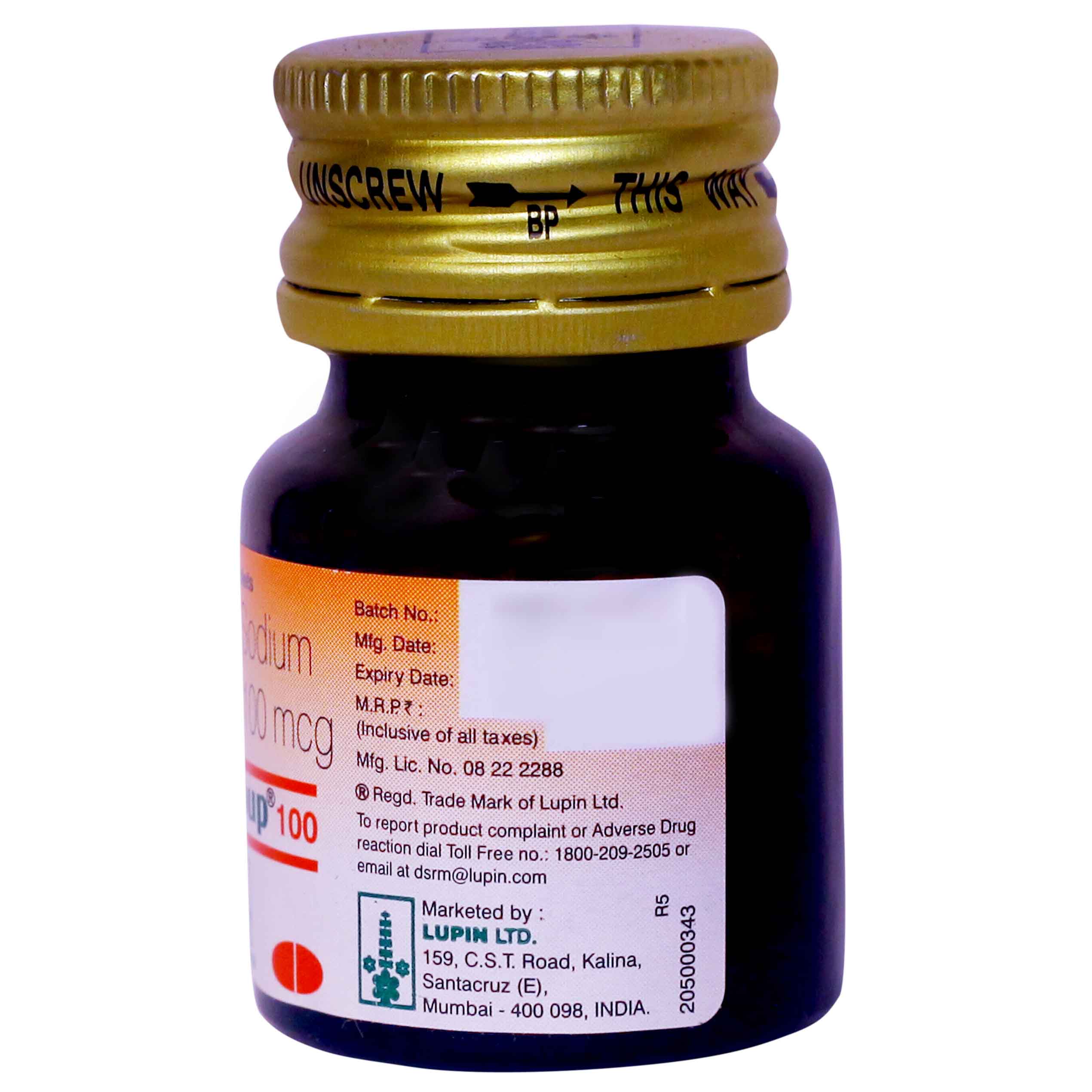
MRP ₹168.5
(Inclusive of all Taxes)
₹25.3 Cashback (15%)
know your delivery time
Provide Delivery Location
Composition :
Manufacturer/Marketer :
Consume Type :
Expires on or after :
Return Policy :
Selected Pack Size:100
100 ₹151.7
(₹1.52 per unit)
In Stock
120 ₹151.7
(₹1.26 per unit)
In Stock

Secure Payment

Trusted by 8 Crore Indians

Genuine Products
Therapeutic Class
Country of origin
Manufacturer/Marketer address
Author Details
We provide you with authentic, trustworthy and relevant information
Disclaimer
Alcohol
Safe if prescribed
You are recommended not to consume alcohol along with THYROUP 100MCG TABLET to avoid unpleasant side-effects.
Pregnancy
Consult your doctor
Only consume THYROUP 100MCG TABLET, if you are prescribed by a doctor. However, the need for levothyroxine may increase during pregnancy due to increased blood levels of oestrogen (female sex hormone) hence, monitoring of thyroid function should be done regularly both during and after pregnancy. In this case, thyroid hormone dose can be adjusted by your doctor.
Breast Feeding
Consult your doctor
Even during high dose levothyroxine therapy, the amount of THYROUP 100MCG TABLET passing into the breast milk during lactation is very low and therefore harmless. However, if you have any doubt consult a doctor.
Driving
Safe if prescribed
THYROUP 100MCG TABLET does not interfere with your ability to drive.
Liver
Consult your doctor
THYROUP 100MCG TABLET can be taken in the prescribed dose as it does not affect the liver.
Kidney
Consult your doctor
THYROUP 100MCG TABLET can be taken in the prescribed dose as it does not affects the kidney. However patient with adrenal gland complication or problem should consult a doctor before its intake.
Children
Safe if prescribed
THYROUP 100MCG TABLET can be given to the children (new-borns and infants) with inborn thyroid hormone deficiency. To achieve normal mental and physical development. The doctor would adjust the dose individually according to the thyroid hormone level and TSH values measured in blood.
Product Substitutes
About THYROUP 100MCG TABLET
THYROUP 100MCG TABLET is primarily indicated for the treatment of hypothyroidism or low secretion of thyroid hormone. It comprises levothyroxine which is a synthetic thyroid hormone that is chemically similar to thyroxine produced by our thyroid gland. Levothyroxine helps to replace missing thyroid hormones and/or relieve stress on the thyroid gland.
THYROUP 100MCG TABLET minimizes symptoms of low thyroid hormones like unknown weight gain, fatigue, sensitivity to the cold and many more. Thus, it helps in replacing the body's own natural thyroid hormone essential for maintaining both mental and physical health.
Take THYROUP 100MCG TABLET as prescribed by your doctor once daily, on an empty stomach, one-half to one hour before breakfast with a full glass of water. THYROUP 100MCG TABLET usually does not have major side effects when taken regularly in the prescribed dosage but, overdosage may cause headache, nervousness, sleeplessness, irritability, diarrhoea, muscle spasm, weight loss, feeling hot even in cool environments, menstrual irregularities (in women) and skin rash. If you missed a dose do not take a double dose as it may produce serious side effects.
Your doctor may prescribe calcium or vitamin D supplements alongside THYROUP 100MCG TABLET for your bone health. THYROUP 100MCG TABLET should not be used for the purpose of weight loss alone. People affected with diabetes taking THYROUP 100MCG TABLET may have altered blood glucose control that may result in increased antidiabetic agents or insulin requirements. Hence, it is recommended that people with diabetes should contact a doctor and carefully monitor their glucose level after starting, changing or discontinuing thyroid hormone therapy.
Uses of THYROUP 100MCG TABLET
Medicinal Benefits Mweb
Key Benefits
THYROUP 100MCG TABLET minimizes symptoms of low thyroid hormones like unknown weight gain, fatigue, sensitivity to the cold and many more. Thus, it helps in replacing the body's own natural thyroid hormone essential for maintaining both mental and physical health. However, THYROUP 100MCG TABLET should not be used for the treatment of weight loss or obesity.
Directions for Use
Side Effects of THYROUP 100MCG TABLET
- Irregular heartbeat (palpitations)
- Muscle spasm
- Headache
- Nervousness
- Irritability
- Sleeplessness
- Tremors
- Muscle weakness
- Increased appetite
- Weight loss
- Diarrhoea
Drug Warnings
Foods like soybean flour, cottonseed meal, cabbage, cauliflower, walnuts, dietary fibre, calcium and calcium-fortified juices may affect the working of THYROUP 100MCG TABLET. Hence, avoid the intake of these foods within several hours of dosing if possible. THYROUP 100MCG TABLET should not be administered to patients with acute myocardial infarction and high blood pressure patients. So, close clinical monitoring of heart function is recommended before taking THYROUP 100MCG TABLET.
Drug-Drug Interactions
Drug-Drug Interactions
Login/Sign Up
Thyroup 100 mcg Tablet may interfere with blood glucose control and decrease the effectiveness of diabetic treatments.
How to manage the interaction:
Inform doctor about all other medications administering, including vitamins and herbs, is crucial. Consult doctor before stopping any medications.
Drug-Food Interactions
Drug-Food Interactions
Login/Sign Up
Tofu Set With Calcium, Ragi, Seasame Seeds, Kale, Milk, Almonds, Bok Choy, Calcium-Fortified Soy Milk, Cheese, Yogurt
How to manage the interaction:
Consumption of calcium supplements/calcium-rich foods, along with Thyroup 100 mcg Tablet may create an insoluble compound that affects the absorption of Thyroup 100 mcg Tablet. Avoid consumption of calcium supplements/calcium-rich foods during treatment with Thyroup 100 mcg Tablet.
Drug-Diseases Interactions
Drug-Diseases Interactions
Login/Sign Up
Habit Forming
Special Advise
- Doses beyond the range of may produce serious or even life-threatening manifestations of toxicity. Thus, if you forget to take THYROUP 100MCG TABLET anytime, take the medicine as soon as you remember to take it. However, if it is almost time for your next dose, you make avoid the skipped dose and continue with your regular regime as advised by your doctor.
- THYROUP 100MCG TABLET should not be used for the treatment of obesity or for weight loss.
- Patients with adrenaline or pituitary gland problem, heart diseases, diabetes, clotting disorders should not take THYROUP 100MCG TABLET without consulting doctor as the dose may need to be adjusted.
- Diabetes patients taking THYROUP 100MCG TABLET should contact the doctor before starting this medicine as it may worsen glycaemic control and may result in increased antidiabetic pills or insulin therapy.
- Regular intake of THYROUP 100MCG TABLET may decrease bone mineral density, particularly in post-menopausal women. Hence, consult your doctor who might prescribe you the lowest dose possible for your bone health.
- If you are taking THYROUP 100MCG TABLET prior to any surgery let your doctor know about this.
- Thyroid function tests are usually done on an empty stomach after overnight (6-8 hrs) fasting.
- Patients with rare hereditary problems of galactose intolerance, the Lapp lactase deficiency or glucose-galactose malabsorption should not take this medicine.
Diet & Lifestyle Advise
- Eating the right nutrients and taking a regular dose of your prescribed medications may help reduce your symptoms and improve your thyroid function. Iodine, zinc and selenium are beneficial for people with hypothyroidism. However, it’s best to avoid iodine and selenium supplements unless your doctor advises you to take them.
- In hypothyroidism usually, there is a loss of calcium (hypocalcemia) and Vitamin D in our body. In such a case, people affected with hypothyroidism should opt for calcium-enriched foods.
- People with hypothyroidism usually have a slower metabolism and eating more protein may help boost your metabolism.
- Daily yoga and aerobics exercises can help in boosting the metabolism.
- People with hypothyroidism should prefer the intake of more vegetables, fruits and lean meats. These foods are low in calories and may help prevent weight gain.
- Avoid taking Goitrogens (agents which interfere with the normal function of the thyroid gland) which generally includes soy foods (tofu), cabbage, broccoli, kale, cauliflower, spinach, sweet potatoes, cassava, peaches, strawberries, millet, pine nuts, peanuts, etc.
All Substitutes & Brand Comparisons
RX
Thyropax 100 Tablet 100's
Alteus Biogenics Pvt Ltd
₹85.5
(₹0.77 per unit)
49% CHEAPERRX
Out of StockThyrobol 100 Tablet 120's
K C Laboratories
₹112.5
(₹0.84 per unit)
44% CHEAPERRX
Out of StockThyrotas 100Mcg Tablet 100'S
Intas Pharmaceuticals Ltd
₹116.5
(₹1.05 per unit)
30% CHEAPER
Buy best Endocrine System products by
Macleods Pharmaceuticals Ltd
Abbott India Ltd
Intas Pharmaceuticals Ltd
Sun Pharmaceutical Industries Ltd
Lupin Ltd
Elder Pharmaceuticals Ltd
Leeford Healthcare Ltd
Samarth Life Sciences Pvt Ltd
East West Pharma India Pvt Ltd
Pfizer Ltd
Alteus Biogenics Pvt Ltd
GlaxoSmithKline Pharmaceuticals Ltd
Icon Life Sciences
Neon Laboratories Ltd
Eris Life Sciences Ltd
Knoll Healthcare Pvt Ltd
Mankind Pharma Pvt Ltd
Morepen Laboratories Ltd
Wockhardt Ltd
Micro Labs Ltd
Primus Remedies Pvt Ltd
Cipla Ltd
Prevego Healthcare & Research Pvt Ltd
Scudder Life Sciences Pvt Ltd
United Biotech Pvt Ltd
AAA Pharma Trade Pvt Ltd
Ferring Pharmaceuticals Pvt Ltd
Merck Ltd
Olcare Laboratories Pvt Ltd
Erinyle Pharma
Novartis India Ltd
Sanatra Healthcare Ltd
Zydus Cadila
Zydus Healthcare Ltd
Clamed Healthcare Pvt Ltd
Comed Pharma
Geneaid Pharmaceuticals
Gland Pharma Ltd
Lyceum Life Sciences Pvt Ltd
Regenix Drugs Ltd
Rockmed Pharma Pvt Ltd
Torrent Pharmaceuticals Ltd
Vasu Organics Pvt Ltd
Zee Laboratories Ltd
Alkem Laboratories Ltd
Alna Biotech Pvt Ltd
Ankaa Pharmaceutical
Atlantis Pharmacorp Inc
Cadila Healthcare Ltd
Chemo Biological Ltd
Corazon Pharma Pvt Ltd
Corona Remedies Pvt Ltd
GLS Pharma Ltd
Hetero Drugs Ltd
Icarus Health Care Pvt Ltd
Ikon Pharmachem
Intra Labs India Pvt Ltd
K C Laboratories
Kabson Medicare
Knoll Pharmaceuticals Ltd
Levin Life Sciences Pvt Ltd
Medopharm Pvt Ltd
Nitro Organics Pvt Ltd
Novo Nordisk India Pvt Ltd
Oaknet Healthcare Pvt Ltd
Overseas Health Care Pvt Ltd
Praise Pharma
Proxima Healthcare
Rhumasafe Pharma
Serum Institute Of India Pvt Ltd
Solas Healthcare
Solis Pharmaceuticals
Startos Healthcare Pvt Ltd
Swisskem Healthcare
Troikaa Pharmaceuticals Ltd
Trumac Healthcare
Wallace Pharmaceuticals Pvt Ltd
Waylon Biotech Pvt Ltd
Actus Health Care
Adonis Laboratories Pvt Ltd
Aeobury Healthcare Pvt Ltd
Aequitas Healthcare Pvt Ltd
Akumentis Healthcare Ltd
Alathea Biotec Pvt Ltd
Alexpen Remedies
Allergan Healthcare India Pvt Ltd
Arinna Lifesciences Ltd
Azillian Healthcare Pvt Ltd
Baxium Healthcare
Bioceutics Inc
Biochemix Health Care Pvt Ltd
Biocute Life Care
Biohexol Lifesciences
Biokindle Lifesciences Pvt Ltd
Biosync Pharmaceutical Pvt Ltd
Brochem Health Care Pvt Ltd
Cadila Pharmaceuticals Ltd
Capital Pharma
Capri Pharmaceuticals Pvt Ltd
Celon Laboratories Pvt Ltd






